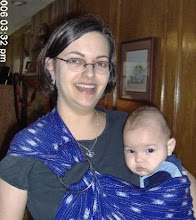In everyday life, we respond in instinctive ways to pain. If you drop something on your foot, you automatically rub yourself because rubbing causes your body to make endorphins which are natural pain-killing substances. If you have a bad stomach ache, you would probably lie down and curl up in a ball with a heatpad because warmth and being in a particular position are very comforting. It would seem that pain tells us how to help ourselves recover from injury. In labour, there is no injury taking place, but the pain teaches the woman how to give birth. She is led by it to try a variety of positions to increase her comfort and by moving around and using different positions, she is also helping her baby's head to press down firmly all around the cervix so that it opens up evenly. Later in labour, her changes of position cause the baby to be shifted one way and then the other, helping him to find the easiest way down through the pelvis.
Thursday, December 14, 2006
Epidurals aren't for wimps
Tuesday, December 12, 2006
Epidurals May Negatively Affect Breast-Feeding
Researchers found that 93 percent of the women in the study breast-fed their baby in the first week after birth. However, women who had an epidural were significantly more likely to have difficulty breast-feeding during the first few days after delivery and to breast-feed less often than other women.
At 24 weeks, 72 percent of women who did not have an epidural were breast-feeding, compared with 53 percent who received pethidine or epidurals containing bupivacaine and fentanyl (an opioid).
Pat O'Brien, a spokesman for the Royal College of Obstetricians and Gynaecologists, said it was possible that fentanyl had an effect on the baby.
But he added: "There are other factors which may explain this link, including that if a woman chooses not to have an epidural, she may also be more motivated to persevere with breastfeeding.
"Also, a lot of those women who had epidurals also went on to have Caesarean sections which - unless you have a lot of support - make it difficult to breastfeed because it's harder for women to pick their babies up."
(link)
Sunday, December 10, 2006
Miscarriage Risks
Although the reasons behind miscarriage are still vague, the researchers did establish some other common risk factors. The study found that single women were at an increased risk of miscarriage, as were women who had had a previous abortion (60% higher risk) and those who had had IVF (40% higher risk). Those who took more than a year to conceive were twice as likely to miscarry as women who had conceived within the first three months.
The researchers also revealed factors in maintaining a healthy pregnancy. Two-thirds of the women they studied who took vitamin supplements during early pregnancy reduced their risk of miscarriage by around 50%. The effect was most pronounced among those taking folic acid or iron and multivitamins containing these. Eating fresh fruit, vegetables and chocolate daily was also found to halve the odds of a miscarriage.
The study also showed that
Women who suffered from nausea and sickness in the first 12 weeks of their pregnancy were almost 70% less likely to miscarry, especially those with severe sickness.
Interestingly, and somewhat reassuringly:
Supposed risk factors such as alcohol consumption, smoking and caffeine intake were unconfirmed in the study.





